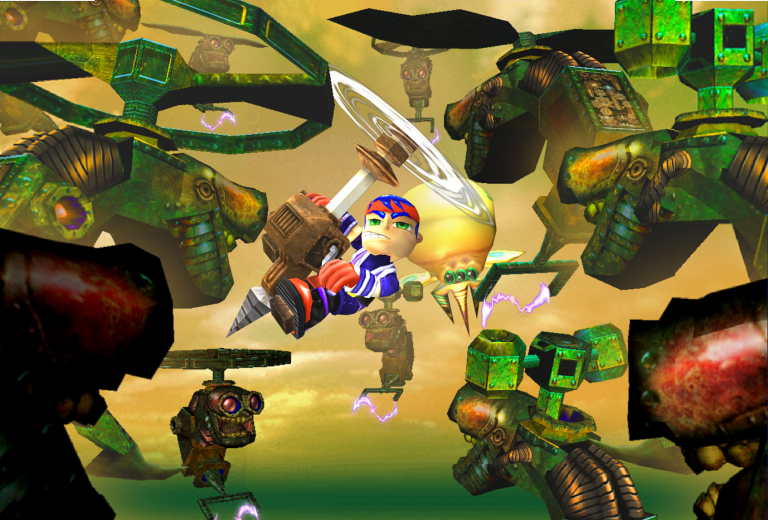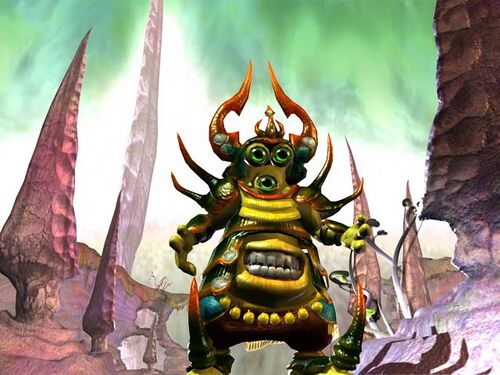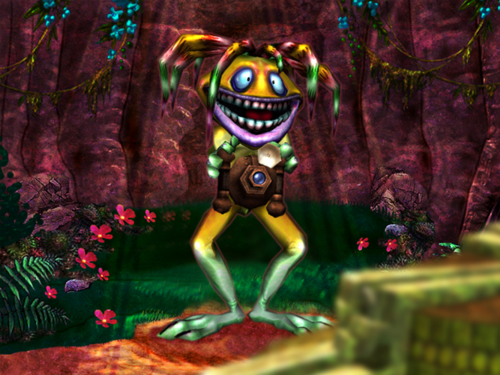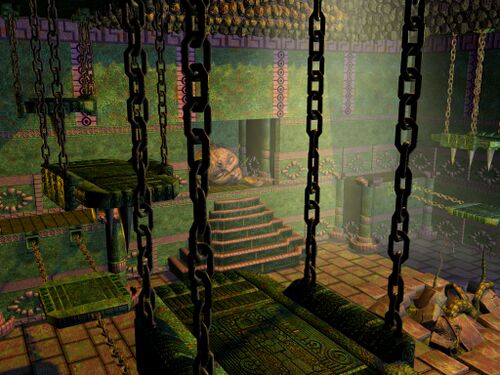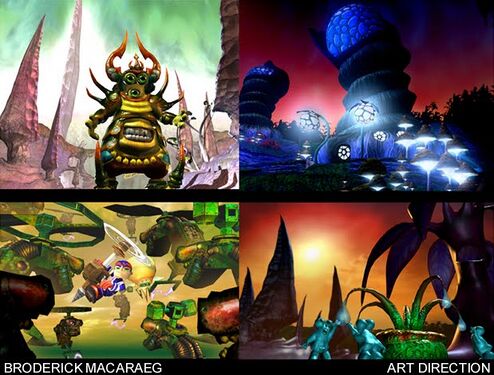Teebo & Kai (lost build of cancelled PC/Xbox platformer; 2000-2001)
Teebo & Kai (also known as Teebo and Kai: The Search For Awl) is a cancelled platformer game developed by Escape Factory from August 2000 to April 2001 for either the PC or Xbox. The project, commissioned by Valve Corporation, saw the establishment of a demo build containing features like an online cooperative mode. Alas, further development was cancelled by Valve, supposedly in favour of an Xbox port of Team Fortress Classic that also never materialised.
Background
Escape Factory was officially founded on 10th July 2000 by James Gwertzman and Ed Allard in Seattle, Washington.[1][2][3][4] Beforehand, the pair had conducted a year's worth of market research, including by attending E3 2000.[2] Gwertzman was previously employed at Microsoft as a lead program manager and in relationship marketing across Asia, eventually leaving the company after five years.[5][3][2] He would become Escape Factory's president; meanwhile, Allard accumulated five years of experience as a senior software engineer for Silicon Valley-based companies Liquid Audio and Silicon Graphics.[3][2] Though both held considerable expertise in the software and technology industries, Gwertzman admitted in his 2003 and 2004 presentations on Escape Factory's demise that neither he nor Allard shared much knowledge of the current games market.[2] Additionally, neither had even worked in the games industry prior to Escape Factory's launch.[1]
With this in mind, Escape Factory opted to play it safe and link up with an established games company.[1] Situated in nearby Kirkland was Valve Corporation, which at that point exclusively developed and released games on the PC.[6] However, Valve began a focus on console releases by the turn of the millennium, working alongside game publishers like Sierra Studios and Microsoft Studios to port the likes of Half-Life and Counter-Strike to the PlayStation 2 and Xbox respectively.[7][8] On 14th August 2000, Escape Factory signed a contract with Valve that granted it access to its incubation programme.[1][2] It started employing personnel in October that year;[2] among its early hirings included Broderick Macaraeg as its art director and Ian Wilmoth as its lead 3D director.[9][10][11]
Teebo & Kai
Escape Factory based themselves at Valve's Kirkland offices throughout the project's lifespan.[1] Based on Gwertzman's timeline for "What to Do When it All Goes to Hell" presentation, as well as the Escape Factory website, the project lasted from 14th August 2000 to 25th April 2001.[2][1] The organisation was tasked to establish an experimental prototype demo, harnessing Valve's technologies.[12][1] According to the archived Escape Factory website, the game was another major modification of the original Half-Life, built on the GoldSrc engine.[12][11] Vaguely described as a "cooperative platform game prototype" on Gwertzman's LinkedIn page,[5] the game was kept under wraps by both Escape Factory and Valve and so received no contemporary news reports.[13][14][4] Macaraeg and Wilmoth conflict on which platform the game was being developed for, stating in their portfolios that it was exclusively for the PC or Xbox respectively.[9][10][11] Based on Escape Factory's About Us page, Wilmoth's claim is probably more accurate, as the company was fixated on delivering "multiplayer collaborative gaming" for consoles.[12] In his research, games journalist Tyler McVicker determined this meant the game would have included a two-player online cooperative mode.[13][4]
Macaraeg's various online portfolios confirm this game was called Teebo & Kai.[15][9][10] Valve Archive and vghe both claim the game's full title was Teebo and Kai: The Search For Awl, though exactly where they obtained this information is unclear.[16] Regardless, Macaraeg led the platformer's art direction alongside Wilmoth, Taregh Kryger, Lane Daughtry and Jason Robertson.[15] Aside from GoldSrc, the artists also harnessed PhotoShop and Autodesk Maya to produce 3D concept art with cartoon game graphics.[11] Some of these images were shared by Macaraeg in his blog;[17][16] among them included several level designs, a few unique enemies, and the presumed protagonist flying through a set of robotic antagonists.[4][13] The demo received positive remarks from Valve's games testers; Escape Factory therefore pushed the online co-op feature yet further by incorporating several unique collaborative gameplay "design patterns".[12] Though McVicker compares Teebo & Kai to the Super Mario series,[13] the game and Escape Factory's follow-up platformer were identified by Gwertzman as sharing more in common with the PlayStation-exclusive series Rachet & Clank.[2][12]
But although a demo was established with great enthusiasm,[1][2] Valve ultimately soured on the idea.[11][13][4] According to Wilmoth, Valve's president Gabe Newell saw greater market potential in an Xbox port of Team Fortress Classic,[11] a claim McVicker verified from other sources during his research.[13] Thus, Teebo & Kai was cancelled following the demo's completion,[11][13][4] with Escape Factory and Valve mutually parting ways on 25th April 2001.[1][2] Exactly why Newell cancelled Teebo & Kai has not been conclusively determined, though McVicker theorised its online co-op mode was simply too ahead of its time for the console market.[13] As Escape Factory noted on its website, only upwards of a fifth of Americans utilised broadband by the early 2000s.[12] Though the company felt the time was right for a major online co-op console game,[12] it was still considered a risky endeavour as more console gamers relied on landline instead of broadband compared to PC counterparts.[18][13] Thus, a traditional online game may have been a safer move.[13] Despite this, the Team Fortress Classic Xbox port was also cancelled.[13]
There appeared to be no animosity between Escape Factory and Valve, with the former describing its association as a "successful incubation".[1] Its development team refused to give up on the online console co-op concept, and, upon learning of the fledgling Xbox Live's success, swiftly began developing a similar title.[12][2] With backing from Sierra Studios, this concept became a proposed seventh entry of the Space Quest series.[19][11][9] Unlike Teebo & Kai, Escape Factory's Space Quest did receive some news coverage, with its development documented extensively by SpaceQuest.Net.[19][4] Some sources noted the similar assets used in both games, with one proposed Space Quest character even being called "Keebo".[14][13][19] Space Quest was fully cancelled on 19th December 2002.[2] Following this, financial issues, and promising market response to its smaller casual titles on WildTangent, Gwertzman and Allard decided to close Escape Factory in 2003 in favour of launching Sprout Games.[20][2] Eight years later, Valve's Portal 2 featured an elaborate online co-op mode that received great acclaim on both PC and consoles.[21]
Availability
Based on Escape Factory's claims, only a demo build of Teebo & Kai was completed prior to the game's cancellation.[1][2] Because of the lack of news coverage, the platformer's existence only became known to the public thanks to McVicker's video surrounding its development.[13] Though Macaraeg released some concept art in 2008,[17] with Valve Archive among others having reuploaded them elsewhere,[16] the demo build itself has not been publicly released.
Gallery
Videos
Images
See Also
- Electric Playground "Team Fortress 2 Beta" (lost episode of online video game news show; 2007)
- Escape from Team Fortress (found cancelled web series; 2014-2015)
- Get Your Free TVs! (partially found "Half-Life 2" tech demo; 2000)
- Half-Life (found Dreamcast port of first-person shooter; 2000-2001)
- Left 4 Dead 2 "The Cabin in the Woods" (lost build of cancelled movie tie-in DLC campaign for first-person horror shooter sequel; 2009-2010)
- Team Fortress 2 (partially found original builds of PC multiplayer first-person shooter sequel; 1999-2006)
- Team Fortress 2 "Expiration Date" (partially found screenplay and extended cut of animated short; 2012-2014)
- Team Fortress Classic (lost build of cancelled Xbox port of PC multiplayer first-person shooter; existence unconfirmed; early 2000s)
- They Hunger: Lost Souls (found builds of unreleased sequel to "Half-Life" game mod; 2005-2008)
External Links
References
- ↑ 1.00 1.01 1.02 1.03 1.04 1.05 1.06 1.07 1.08 1.09 1.10 Archived Escape Factory providing updates of its status from its founding in 2000 up to its demise in 2003. Retrieved 29th Apr '24
- ↑ 2.00 2.01 2.02 2.03 2.04 2.05 2.06 2.07 2.08 2.09 2.10 2.11 2.12 2.13 2.14 What to Do When it All Goes to Hell: Lessons Learned Shutting Down a Game Studio where Gwerzman presented the failures behind Escape Factory and provided a timeline of its key events. Retrieved 29th Apr '24
- ↑ 3.0 3.1 3.2 Archived Escape Factory summarising its key personnel by the time of its demise in 2003. Retrieved 29th Apr '24
- ↑ 4.0 4.1 4.2 4.3 4.4 4.5 4.6 Unseen64 article on Teebo & Kai. Retrieved 29th Apr '24
- ↑ 5.0 5.1 Gwertzman's LinkedIn profile where he summarised his time at Escape Factory and described Teebo & Kai as "a cooperative platform game prototype". Retrieved 29th Apr '24
- ↑ Gamesradar summarising the history of Valve. Retrieved 29th Apr '24
- ↑ Archived IGN reporting on Sierra publishing Half-Life on the PlayStation 2. Retrieved 29th Apr '24
- ↑ Kotaku summary of the Xbox port of Counter-Strike. Retrieved 29th Apr '24
- ↑ 9.0 9.1 9.2 9.3 Macaraeg's LinkedIn profile where he summarised working for Escape Factory, including for a cancelled PC title called Teebo & Kai. Retrieved 29th Apr '24
- ↑ 10.0 10.1 10.2 Macaraeg's ArtStation profile where he summarised his work for Teebo & Kai and Space Quest. Retrieved 29th Apr '24
- ↑ 11.0 11.1 11.2 11.3 11.4 11.5 11.6 11.7 Wilmoth's Baker Artists portfolio, where he discussed his time at Escape Factory and Valve (p.g. 26-27). Retrieved 29th Apr '24
- ↑ 12.0 12.1 12.2 12.3 12.4 12.5 12.6 12.7 Archived Escape Factory About Us page, where it summarised Teebo & Kai's development. Retrieved 29th Apr '24
- ↑ 13.00 13.01 13.02 13.03 13.04 13.05 13.06 13.07 13.08 13.09 13.10 13.11 13.12 Tyler McVicker summarising Teebo & Kai. Retrieved 29th Apr '24
- ↑ 14.0 14.1 vghe summarising Teebo and Kai: The Search for Awl. Retrieved 29th Apr '24
- ↑ 15.0 15.1 Macaraeg's blog providing concept art for Teebo & Kai and crediting the artists involved. Retrieved 29th Apr '24
- ↑ 16.0 16.1 16.2 Valve Archive providing known assets of Teebo and Kai: The Search For Awl and Space Quest Retrieved 29th Apr '24
- ↑ 17.0 17.1 Macaraeg's blog providing key screenshots of Teebo & Kai. Retrieved 29th Apr '24
- ↑ TechRound reflecting on the importance of landline connections in the early era of online gaming. Retrieved 29th Apr '24
- ↑ 19.0 19.1 19.2 SpaceQuest.Net documenting the timeline Escape Factory's cancelled Space Quest game. Retrieved 29th Apr '24
- ↑ Archived Escape Factory About Us page announcing the company's inactivity in favour of developing casual games under Sprout Games. Retrieved 29th Apr '24
- ↑ Co-Optimus review of Portal 2's co-op mode. Retrieved 29th Apr '24
